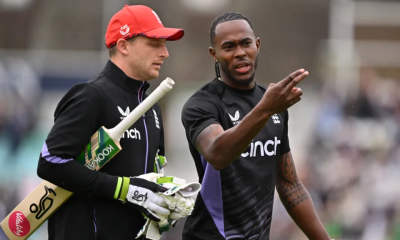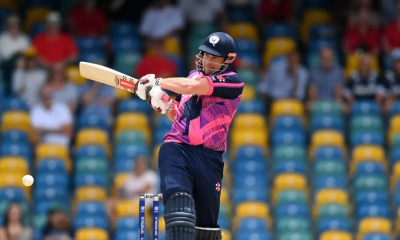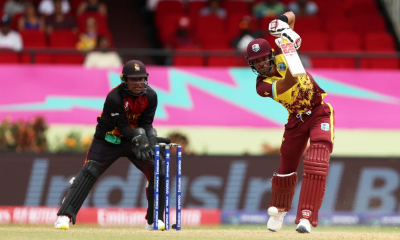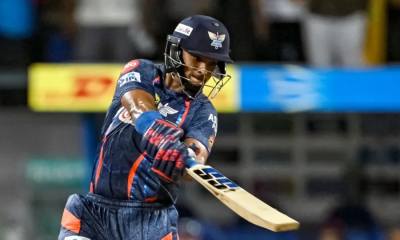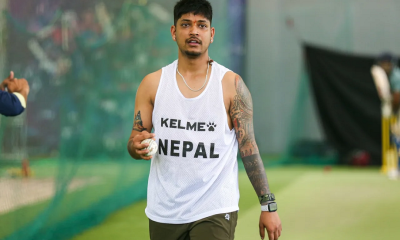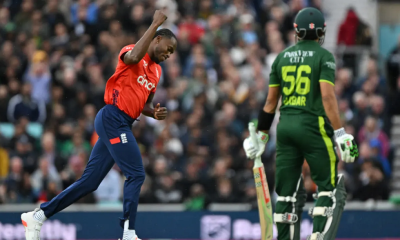Sports
Salt 109 not out, Brook late cameo fire England to dramatic chase of 223
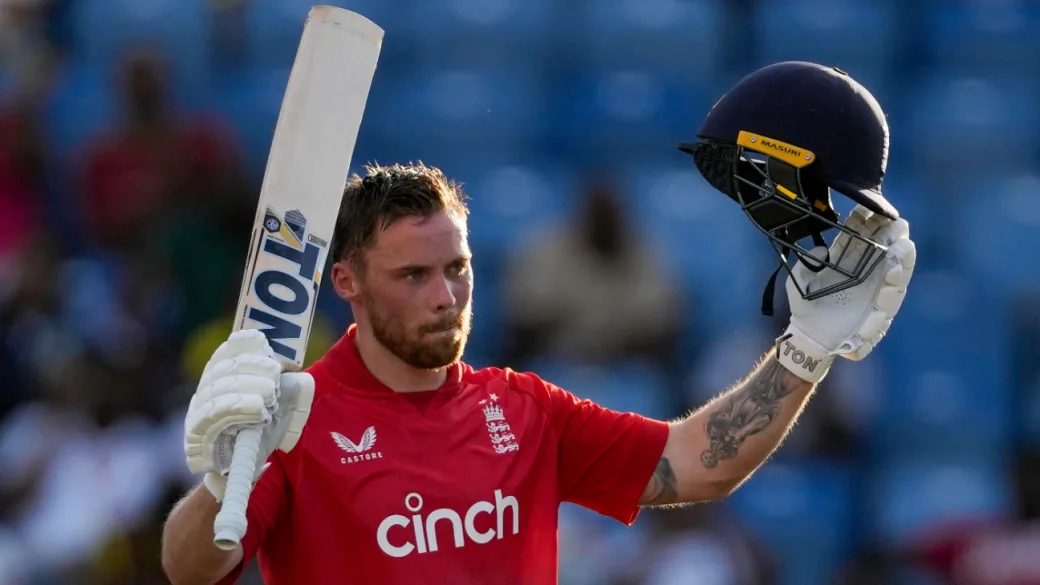
Nicholas Pooran produced a T20I career-best as West Indies showcased their six-hitting chops once again in Grenada’s National Stadium. Phil Salt then did the same on the way to a maiden T20 hundred as England rediscovered their batting mojo. And at the end, an explosive assault from Harry Brook was the clincher, as England burgled 21 runs from final over to bring themselves kicking and screaming back into the series at 2-1 down with two to play.
Brook finished unbeaten on 31 from seven balls, having taken Andre Rusell for 4-6-6-2-6 to seal a record chase on the ground with a ball to spare. Salt was the man watching on from the other end, having himself hit nine sixes in 109 from 56 to set up England’s third-highest successful chase in T20Is. The final sixes count, after Brook’s ice-cool finish: West Indies 16-18 England.
As in the second match, England opted to bowl first and managed to inflict early damage only for West Indies’ power to leave them bruised in the final analysis. Pooran weathered the loss of both openers in the first two overs and batted astutely through the gears to make 82 from 45 balls, with a series of muscular cameos – most notably Rovman Powell’s 39 off 21 – helping to raise a formidable Manhattan through the back end of the West Indies innings.
Having limped home short of a target of 177 two days earlier, England found a spark of their own in a valiant attempt to keep the series alive. Salt and Jos Buttler, who made 51 from 34, put on a century stand as the runs flowed from the outset, only for West Indies – notably through the efforts of left-arm spinner Gudakesh Motie, – to keep a lid on the scoring at a crucial juncture. After Motie had finished his allocation, England were left staring down a requirement of 102 from the last seven overs.
But Liam Livingstone helped add 70 from 34 for the third wicket, Salt bringing up his century from 51 balls moments after hitting Jason Holder for back-to-back sixes. Livingstone holed out but Brook signalled his intent by launching his first ball for six to leave England needing 31 from 12. Joseph conceded 10 from the 19th, nudging the odds in Russell’s favour – only for Brook to leave West Indies’ talismanic allrounder flat out on the canvas after a delirious finale.
Asked to score at more than 11 runs an over, England needed a statement at the top of the order. It was provided, predictably enough, by Buttler. Never mind the patchy form of the last few months that had seen him pass 50 twice in 20 white-ball innings for his country – here he rocked back to launch his second ball, from Akeal Hosein, over long-on before leaning into the next and chipping it languidly for six more through long-off.
Salt notched his first boundary in the following over, and the closest the openers came to being parted early on was when Holder struck his pads next ball – Nigel Duguid’s not-out decision supported by DRS returning umpire’s call on leg stump. Amid the confusion, Buttler might have been run out, stranded two-thirds of the way down the pitch with Salt unmoving.
Salt cleared the ropes at the end of Holder’s over and then boxed Motie’s ears with sixes at the beginning and end of his first, as England raced away to 73 without loss at the end of the powerplay. The boundaries began to dry up with the field spread, though Salt mangled Hosein over long-off to bring up England’s 100 in the tenth – a first century stand for Salt and Buttler as an opening pair and England’s first since they had dismantled India at Adelaide in the 2022 T20 World Cup semi-final.
Motie had delivered his full allocation on this ground two nights ago at a cost of nine runs. This time that figure was surpassed in the space of four balls, as his first over went for 18; but when he switched ends shortly before the halfway mark, the left-arm spinner was able to exert a vital measure of control for his captain, Powell. Pushing his pace up above 100kph, he conceded just five runs from his second – the ninth of the innings – and then four more from the 11th.
With the required rating rising, Buttler was then smartly caught at deep backward square off Russell – Hosein taking the catch comfortably inside the rope before tossing it to Alzarri Joseph as he went out of bounds. In the next over, Motie’s last, he conceded just three runs to go with the wicket of Will Jacks, edging behind for a frustrated 1 off six balls. England at that stage needed to score at almost 15 runs an over – the rate would rise as high as 17.75 by the end of the 16th – but there was still a twist to come.
Few batters in the English game possess the same level of native belligerence as Salt, but he has struggled to find the right balance between attacking intent and building an innings. This was only the second time in his T20I career that he had faced more than 35 balls, and yet he managed the closing stages of England’s chase superbly before giving way to Brook for the coup de grace.
With Salt on 81 from 47, and West Indies seemingly on the brink of shutting the game down, he struck three consecutive sixes off Joseph and Holder before a single took him to his second hundred in an England shirt – and his first significant score of a tour on which he will have hoped to reassert his credentials in both white-ball formats. There was one more six to come, lofting Joseph over long-off in the penultimate over to keep England just about in touch. But equally impressive in searing afternoon heat was his fitness, running 24 singles, six twos and a three to help England stay the course.
England made two changes to their XI, bringing in seamers Reece Topley and Gus Atkinson for Rehan Ahmed and Chris Woakes. After Mooen Ali found some grip to bowl Brandon King with his fifth ball, Topley set about demonstrating his value with the new ball. Playing for the first time since a finger injury ended his ODI World Cup back in mid-October, he was immediately back into the groove, finding swing and bounce with his third delivery to square up Kyle Mayers and nick the opener off for nought.
West Indies were 8 for 2 and in danger of making an even worse start than they managed in the second match. They counterpunched through a half-century stand between Pooran and Shai Hope, but Topley was almost blemish-free during his opening three-over spell in the powerplay, conceding a single boundary for figures of 3-0-14-1.
Pooran walked out in the first over and, although he struck a six and two fours inside his first ten balls, was measured in his approach during the first half of the innings as he rebuilt with Hope, initially, and then Powell. He was on 32 from 23 at the halfway stage of the innings and, although he swatted Atkinson for a third six in the next over, it was Powell who provided most of the impetus during their fourth-wicket stand of 58 from 5.2 overs.
Powell looked in the mood to better his 27-ball fifty on the same ground two days before, smashing Livingstone for back-to-back sixes, but was eventually defeated by a Sam Curran bouncer to be caught behind. England clawed back some ground, with Curran producing two tight overs after being dismantled by Powell in the first T20I, but Pooran was content to bide his time as he ticked along to a 37-ball half-century, reached via a delicate dab off a Rashid googly.
The next over saw West Indies flex their six-hitting muscle again, as Tymal Mills was collared for 25 runs: Sherfane Rutherford hit him straight and over square leg for four and six, before Pooran regained the strike and went 4-6-4 – the pick being a flat thrash over cover. Two more sixes came off Rashid, and by the time he picked out long-on off the legspinner, Pooran had plundered 28 runs from his last seven balls.
Rutherford, replacing the out-of-form Shimron Hetmyer, quickly caught the mood with a punchy 29 off 17 – although he became a second wicket for Curran, whose figures were dented during a 19th over that cost 21, and concluded with Russell creaming him for an almighty straight six from his third ball. That was six No. 14 for the innings, and although Topley started his final over well, Holder ensured that the ticker would keep spinning, battering two more hits over the ropes to finish with 18 from five balls and ensure West Indies would comfortably eclipse the previous highest score on this ground.
Brief scores:
England 226 for 3 in 19.5 overs (Phillip Salt 109*, Jos Buttler 51, Liam Livingstone 30, Harry Brook 31*) beat West Indies 222 for 6 in 20 overs (Nicholas Pooran 82, Shai Hope 26, Roveman Powell 39, Sherfane Rutherford 29; Adil Rashid 2-32, Sam Curran 2-34) by seven wickets
(Cricinfo)
Sports
England face Australia in the battle of champions
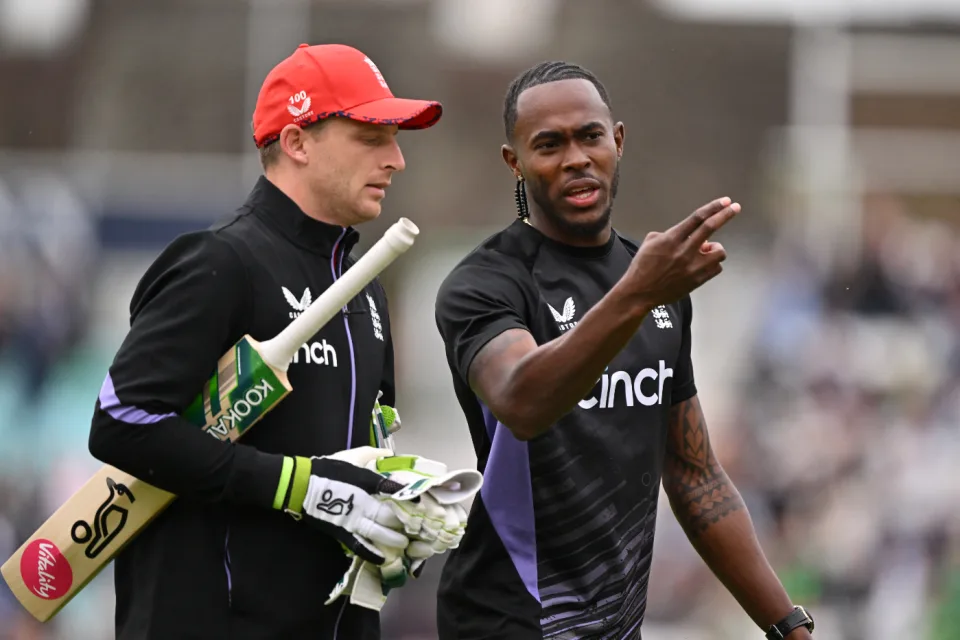
The first truly heavyweight clash of this expanded T20 World Cup format comes freighted with both history and subplots. A rematch of the 2010 World T20 final at Kensington Oval, the match pits Jos Buttler’s defending champions – who are aiming to become the first team to retain the trophy – against the Australian winning machine, victors at the 2021 edition and current world title-holders in Test and ODI cricket. And that’s before you throw in the Ashes for afters.
Already there is added pressure on England, after the rain in Bridgetown led to a share of the points in their opener against Scotland (and that having conceded 90 runs from 10 overs without taking a wicket in a tepid bowling display). Lose to their oldest rivals and it will leave their Super 8 prospects open to being waylaid by the perils of net run-rate calculations, or worse.
The Scotland match was the third abandonment in five suffered by England, after a rain-affected home series against Pakistan, which has clearly hampered their readiness for this campaign after almost six months without playing T20 together. It does not take much for a side to click in this format – and England looked in decent shape when they did get on the field against Pakistan – but Buttler will be anxious for things to go their way on Saturday, if only to avoid further questions referencing the team’s disastrous ODI World Cup defence last year.
Australia, under the laidback leadership of Mitchell Marsh would love nothing more than to add to the English sense of jeopardy – having helped bundle them out of the tournament in India on the way to taking the crown. Their head to head record is less impressive in T20 however, with England having won six of the last seven completed encounters, as well as that 2010 final.
Despite a wobble with the bat, Australia avoided mishap against Oman earlier in the week, the experience of David Warner and Marcus Stoinis shining through in difficult batting conditions. Surfaces in the Caribbean – not to mention those games staged in the USA – have already had teams scratching their heads; rather than the “slug-fest” England had prepared for, following a high-scoring tour of the Caribbean in December, it looks as if boxing smart may be the way to go.
Speaking of Warner, this could be the last time he faces up against England in national colours – and another match-winning contribution would likely reduce the chances of them meeting again in the knockouts. On the other side of the card is Jofra Archer, fresh from an emotional maiden outing at Kensington Oval and ready to take on Australia for the first time in any format since 2020. Can Mark Wood fire up England’s campaign, as he did during last summer’s Ashes? Will Pat Cummins be back to harass the old enemy once again? Seconds out, it’s almost time to rumble.
Cummins is set to return after being rested for the Oman game, which saw Mitchell Starc leave the field with cramp. Starc is understood to be fine and could keep his place – which would likely see Nathan Ellis miss out. Marsh is still not fit to bowl, with Australia likely to continue with the allrounder combination of Stoinis and Maxwell to give them cover.
Australia (probable XI): David Warner, Travis Head, Mitchell Marsh (capt), Glenn Maxwell, Marcus Stoinis, Josh Inglis (wk), Tim David, Pat Cummins, Nathan Ellis/Mitchell Starc, Adam Zampa, Josh Hazlewood
The one change England may consider is Reece Topley coming in for Wood, with the expectation that there will be some rotation among the seamers through the course of the tournament.
England (probable XI): Phil Salt, Jos Buttler (capt & wk), Will Jacks, Jonny Bairstow, Harry Brook, Liam Livingstone, Moeen Ali, Chris Jordan, Jofra Archer, Adil Rashid, Reece Topley/Mark Wood
[Cricinfo]
Sports
South Africa up against their bogey team in batter-unfriendly New York
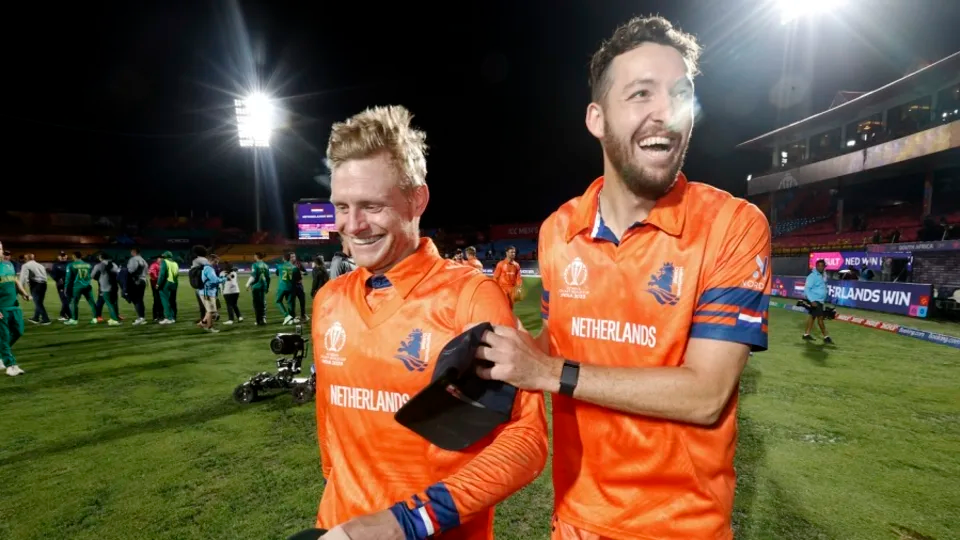
Once is coincidence, twice is a clue, and three times is proof.
To paraphrase Agatha Christie, that is the narrative around South Africa’s meeting with Netherlands at this T20 World Cup.
The Dutch beat South Africa at the 2022 tournament and ended their semi-final hopes in a match where South Africa appeared to be sleep walking, and then beat them again at the 2023 ODI World Cup, where they exposed South Africa’s vulnerability in the chase. If they to do the treble, not only will Netherlands take the lead in Group D, but they will offer conclusive evidence of the threat they pose to Full Members, especially South Africa.
Of course, it will take some doing after South Africa’s opening performance against Sri Lanka, where they reduced their opposition to their lowest T20I total and chased it down in fairly straightforward fashion thanks to the most stable middle-order of their white-ball era. In Aiden Markram, Tristan Stubbs, Heinrich Klaasen and David Miller, South Africa have bankers and big-hitters and, for this match, they also have the advantage of experience. They’ve already played at Eisenhower Park, and have first-hand knowledge that run-scoring doesn’t come easily;Klassen said they are prepared to use their “cricket brains” and play “smarter cricket”.
But the conditions could be good news for Netherlands, who are not naturally a line-up of big hitters and build their innings on a foundation of turning ones into twos. In other words, they tend to take a slightly more conservative approach to batting, which may work well here, but they’ll be wary of the uneven bounce of the surface and will have to come up with plans to counterattack especially against South Africa’s seamers. Their own bowlers were exemplary in Dallas and will look to build on that performance against a line-up that will likely be more proactive than Nepal’s, but who they have managed to keep quiet not once, but twice in the past. Third time’s the charm, they say.
Anrich Nortje’s stunning return to form against Sri Lanka means South Africa may not have to tinker with the bowling combination, and Gerald Coetzee and Tabraiz Shamsi may have to wait their turns to get a game. The batting line-up should be unchanged, with no space for Ryan Rickelton yet.
South Africa: Quinton de Kock (wk), Reeza Hendricks, Aiden Markam, Tristan Stubbs, Heinrich Klaasen (wk), David Miller, Marco Jansen, Keshav Maharaj, Kagiso Rabada, Ottneil Baartman, Anrich Nortje
Conditions in New York may tempt Netherlands to include an extra seamer and they have Kyle Klein in their squad. But it could come at the expense of a shortened batting line-up and they may not want to risk that.
Netherlands: Michael Levitt, Max O’Dowd, Vikramjit Singh, Sybrand Engelbrecht, Scott Edwards (capt, wk), Bas de Leede, Teja Nidamanuru, Logan van Beek, Tim Pringle, Paul van Meekeren, Vivian Kingma
[Cricinfo]
Latest News
Mustafizur, Rishad, Hridoy dazzle in Bangladesh’s tight two-wicket win over Sri Lanka
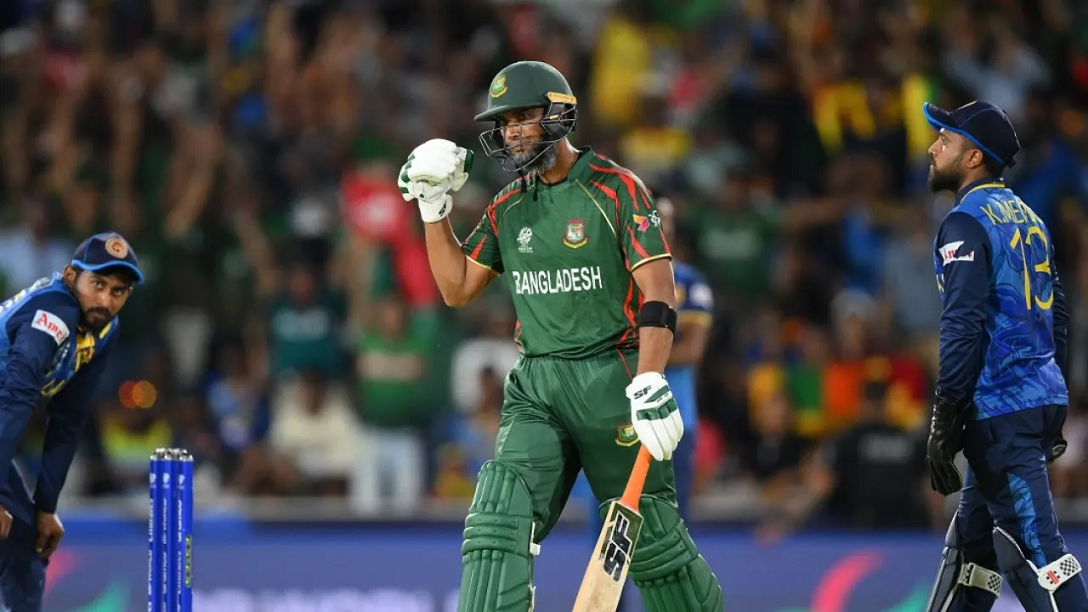
Nuwan Thushara’s last over brought Sri Lanka screaming back into the match,as he first bowled Rishad Hossain, and then nailed Taskin Ahmed in front of the stumps with a pinpoint swinging yorker. This left Bangladesh eight wickets down, with 12 runs still to get.
However, the experienced Mahmudullah was at the crease for Bangladesh, and despite some further nervy moments, pushed Bangladesh across the line off the last ball of the 19th over.
But this was a match chiefly decided by Bangladesh’s own outstanding bowling. Mustafizur Rahman was the best among them, using shorter lengths and his cutters efficiently, to claim figures of 3 for 17. Rishad Hossain’s three-for through the middle overs also kept Sri Lanka quiet.
Mustafizur was instrumental in Sri Lanka’s downward spiral through the middle overs, which culminated in a crash-and-burn end. Ultimately, their inability to find boundaries, or even rotate strike against good Bangladesh bowling resulted in their downfall. A score of 125 for 9 always seemed poor on a decent pitch, even if their bowlers made a match of it in the end.
Brief scores:
Bangladesh 125 for 8 in 19 overs (Towhid Hridoy 40, Litton Das 36; Dhanajaya de Silva 1-11, Nuwan Thushara 4-18, Wanidu Hasaranga 2-32, Matheesha Pathirana 1-27) beat Sri Lanka124 for 9 in 20 overs (Pathum Nissanka 47, Dhananjaya de Silva 21; Tanzim Hasan Sakib 1-24, Taskin Ahmed 2-25, Mustafizur Rahman 3-17, Rishad Hossain 3-22) by two wickets
[Cricinfo]


